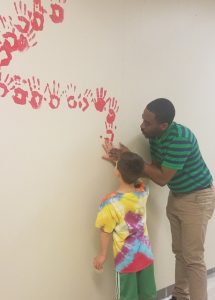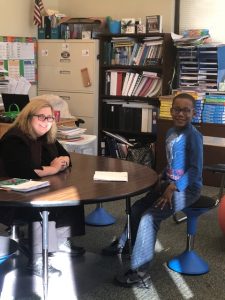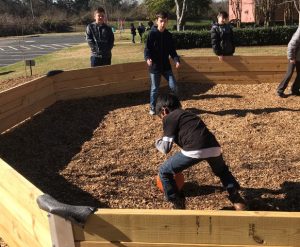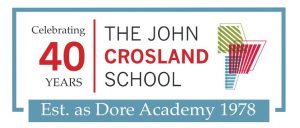By Lynn Bonner, Tutoring and Summer Program Coordinator, The John Crosland School
When I think of summer, my thoughts turn to having good times by exploring while running, climbing, and splashing about our wonderful world, by imagining the possibilities of doing things that conventional thinkers think are impossible, and by experimenting with and inventing all sorts of contraptions and gadgets to get things done. My thoughts turn warmly to camps, summer classes, and relaxing with good books, that are great friends and fuel for my imagination. These dreams are not just dreams of the past about myself, but dreams of the future for all students and active learners.
The John Crosland School wants to provide a place of childhood wonder for students where they can explore, imagine, experiment, and invent with the confidence, desire, and skills to succeed. In the article, The Case for Summer Learning: Why Supporting Students and Families All Year Is Vitally Important, the author Sarah Pitcock, who is a coeditor and coauthor of The Summer Slide: What We Know and Can Do About Summer Loss, states, “By reviewing existing research and interviewing providers, Rand found several aspects critical to successful summer programming. These include offering small class sizes and individualized instruction, engaging students in fun enrichment activities, providing transportation to and from the program, offering full-day program options, and notifying parents early before they make other plans for the summer.” (Pitcock,2018, pg. 6) In our program at The John Crosland School, we are offering a unique combination of high-interest and enriching classes. Our morning core courses in literature, mathematics, writing, and science are presented in small classes with a maximum of 10 students. They are presented in a fun and engaging manner with activities such as art, building, cartooning, computer detecting, cooking, drama, and experimenting. We, also, have a special class that focuses on executive functioning and social thinking, which helps us navigate through our environment physically, emotionally, and verbally. In the afternoon day camp, the fun enrichment activities continue in a less formal setting. In addition, we are offering individual tutoring in mathematics, writing, reading comprehension, and research-based Orton Gillingham instruction for direct instruction in reading, and spelling. 
McEachin, Augustine, and McCombs in their article, Effective Summer Programming: What Educators and Policymakers Should Know, which is drawn from their chapter in The Summer Slide: What We Know and Can Do About Summer Loss found that having a small class size combined with 4 hours of participation a day, with at least 70 hours in total, has positive effects when fighting the “summer slide.” (McEachin, Augustine, and McCombs, 2018) Our program lasts 5 weeks with 16 hours of instruction a week which makes a total of 80 hours if you choose just the morning option all 5 weeks.
Our desires to serve your child and follow the best policies are very important, but hearing testimonials from actual families is the most personal and, perhaps, the very best measurement.
AE., a mother of an elementary student, said “The benefits of the Summer Tutoring Program at the John Crosland School are tremendous. The reading and math summer programs have been tailored to specifically meet our son’s needs, reinforce concepts he has learned during the year, and push him forward. We didn’t experience the summer brain drain this past summer!” Her son, C. E., said, “The tutoring program is fun and cool.”
E.G., a middle school student in the Social Thinking camp last year, said, “It made me think creatively.” J.G., his dad, said, “You have to connect creatively with others in their environment, and that’s what he did!” His mother, L.G., said, “At first he had trepidations, but my son said that it was so much fun that it didn’t feel like summer work!”
V. B., a mother of an older student, said, “Summer half-day camps at Crosland and summer tutoring has proven to be a great combination for my daughter, now a ninth grader in her third year at Crosland. She enjoys the camaraderie of the camps and the creativity of the individual tutoring. She says, “They are fun! The activities in the camps are entertaining and challenging, and I had a good time with new and old friends. I liked that in tutoring, my teacher had me use art to help me improve my reading.” I am grateful that she’s having a good time while avoiding the summer skills regression. Imagine, my child, for whom written expression is not a strength, loving a written expression camp, and for whom art is a strength, getting to use it to build reading comprehension.”
We serve both traditional and nontraditional learners from multiple counties. While we cannot provide transportation, we hope that we have given you ample time to consider if our summer programs will benefit your rising first through eighth grade student. To get information:
– Go to johncroslandschool.org
– Go to the Academics tab
– Go to Additional Services
– Go to Summer Programs where you can find more information and print all forms

We wish success for your students and the academic strength to be whatever they dream of being. It may be in a STEAM field including all types of sciences, technologies, engineering, arts, or mathematics. Or it may be using their intelligence and imagination to teach or write great books to fuel success and imagination in others!
References
McEachin, A., Augustine, C., & McCombs, J. (2018). Effective summer programming: What educators and policymakers should know. American Educator, 42(1), 10-11. Retrieved from: https://files.eric.ed.gov/fulltext/EJ1173313.pdf
Pitcock, S. (2018). The case for summer learning: Why supporting students and families all year is vitally important. American Educator, 42(1), 4-8. Retrieved from: https://files.eric.ed.gov/fulltext/EJ1173455.pdf
The John Crosland School
5146 Parkway Plaza Blvd.
Charlottte, NC 28217
704-365-5490 ext 709
Website
Blog
Facebook
Instagram: @johncroslandschool and @dogsofcrosland
Twitter: @croslandschool



